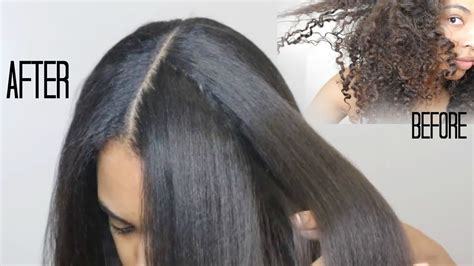Introduction
Curly hair is a beautiful and unique expression of individuality. However, it can also be challenging to manage, especially if you’re looking for a smoother, straighter look. Curly hair relaxers offer a solution to this challenge, providing a safe and effective way to achieve your desired style.

Understanding Curly Hair Relaxers
Curly hair relaxers are chemical treatments that break down the disulfide bonds in your hair, which are responsible for its curly shape. This allows the hair to be stretched and straightened, resulting in a smoother, more manageable texture.
There are two main types of curly hair relaxers:
- No-lye relaxers: Use a cream base and do not contain lye, making them gentler on the hair and scalp.
- Lye relaxers: Contain lye, which can be more effective but also more damaging to the hair and scalp.
How Do Curly Hair Relaxers Work?
Curly hair relaxers typically follow a three-step process:
- Application: The relaxer is applied to the hair and left on for a specified amount of time, usually 15-30 minutes.
- Neutralization: After the processing time, the relaxer is neutralized using a neutralizing shampoo or conditioner, which stops the chemical reaction and prevents further damage.
- Rinsing: The hair is thoroughly rinsed to remove any remaining relaxer.
Benefits of Curly Hair Relaxers
- Smoother hair texture: Relaxers significantly reduce frizz and make hair easier to manage.
- Reduced shrinkage: Relaxed hair has less tendency to shrink when it gets wet, making it easier to style.
- Versatile styling options: Relaxed hair can be styled in a variety of ways, including blowouts, flat ironing, and curling.
Things to Consider Before Relaxing Your Hair
- Hair type: Relaxed hair is best suited for tightly curled or coily hair.
- Hair condition: Relaxed hair can damage weak or damaged hair, so it’s important to consult with a stylist to determine if your hair is healthy enough for a relaxer.
- Chemicals: Curly hair relaxers contain chemicals that may cause irritation or allergic reactions. Always do a patch test before using a relaxer.
Safety Considerations for Curly Hair Relaxers
- Chemical exposure: Lye relaxers can be harsh on the scalp and hair, increasing the risk of hair loss and breakage.
- Scalp irritation: Relaxers can cause scalp irritation, itching, and burns.
- Allergic reactions: Some people may experience allergic reactions to the chemicals in relaxers.
Alternatives to Curly Hair Relaxers
If you’re not ready to commit to a relaxer, there are other options available to help you manage your curly hair:
- Protein treatments: These treatments help strengthen and smooth hair, reducing frizz and making it more manageable.
- Keratin treatments: Similar to relaxers, keratin treatments break down the disulfide bonds in hair, but they do not straighten it as much as relaxers.
- Thermal hair styling tools: Flat irons and blow dryers can help straighten and smooth curly hair temporarily.
How to Choose the Right Curly Hair Relaxer
The best curly hair relaxer for you depends on your hair type, condition, and desired results. Here are some factors to consider:
- Strength: Relaxers come in different strengths, with stronger relaxers being more effective but also more damaging.
- Ingredients: Look for relaxers that contain conditioning ingredients, such as shea butter or coconut oil, to protect your hair from damage.
- Brand reputation: Choose a relaxer brand with a good reputation for safety and effectiveness.
Tips for Relaxing Your Curly Hair Safely
- Follow instructions carefully: Read and follow the instructions on the relaxer package carefully.
- Use a barrier cream: Apply a barrier cream around your hairline and ears to protect them from the relaxer.
- Test a small area first: Do a patch test on a small area of skin to check for any allergic reactions.
- Avoid over-processing: Leave the relaxer on for the recommended amount of time only. Over-processing can damage your hair.
- Rinse thoroughly: Rinse your hair thoroughly after neutralizing the relaxer to remove any remaining chemicals.
- Deep condition your hair: Deep condition your hair after relaxing to restore moisture and prevent damage.
Conclusion
Curly hair relaxers offer a transformative solution for those looking to achieve smoother, straighter hair. While they come with potential benefits, it’s important to consider the safety implications and choose the right product and application method to minimize risks. With proper care and precautions, you can enjoy the versatility and style options that relaxed hair provides.
